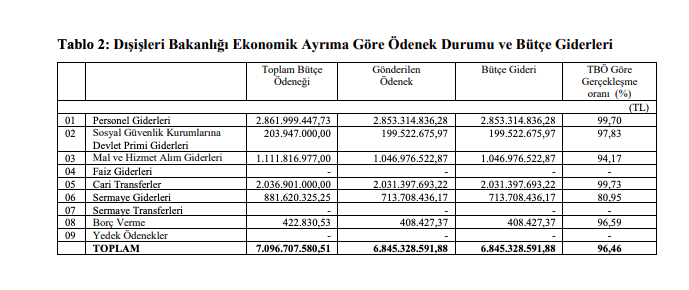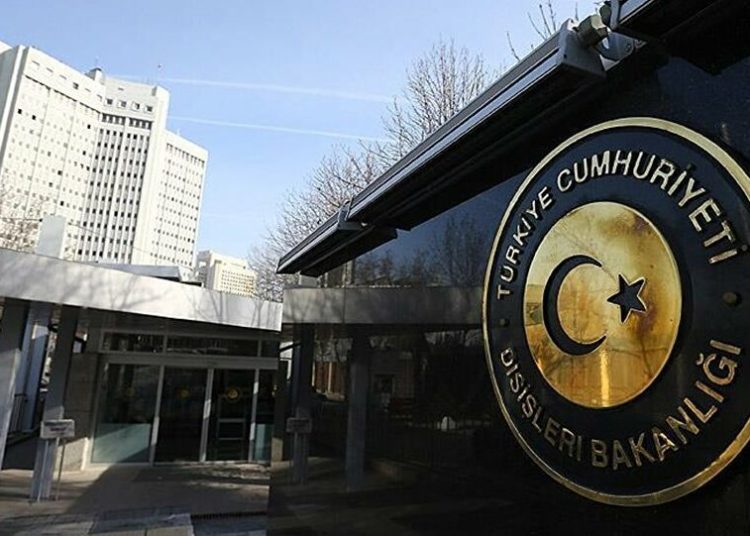Levent Kenez, Stockholm
In its report for 2021 issued by the Court of Accounts (Sayıştay), which is responsible for financial audits of state institutions, a series of irregularities and omissions were identified at the Ministry of Foreign Affairs. According to the report, the ministry did not submit some financial statements to the court within the period required by law. It also stated that the ministry failed to remedy a personnel shortage related to the conduct of internal audits despite having been warned about it several times in the past.
The report also notes that some of the expenses incurred in 2020 appear in the accounting records as transactions in 2021.
The Ministry of Foreign Affairs budget, which was 5.4 billion lira in 2020, was increased to 7.01 billion lira in 2021. While the total net revenue of the ministry in 2020 was 995.2 million lira, it increased to 2.3 billion lira in 2021. Expenditures increased to 8.9 billion lira from 7.4 billion lira within the same period.
The Court of Accounts report also includes deficiencies and failures in the ministry’s organizational chart. It stated that job descriptions were not created on the basis of actual positions, making them difficult to audit. It also mentioned that there is no clear regulation at the ministry regarding the delegation and limits of authority.
The biggest deficiency mentioned in the report is that the ministry does not conduct its own internal audits nor has it employed sufficient staff to carry out this task.
The report claims that due to an insufficient number of personnel abroad, employees in diplomatic missions have to do the work of several people and that this creates various financial and managerial risks.
The Court of Accounts also notes that a commission in the ministry tasked with auditing financial transactions once a year according to regulations failed to do so.
The court underlined that while there is only one person responsible for financial audits in the ministry, previous reports since 2017 warned the ministry that at least 15 internal auditors should be hired.
The report also states that “although transactions related to 150 equipment purchases, 253 device purchases, 254 vehicle-related expenditures and 255 inventory purchases were realized in 2020, these were recorded in the accounting records as 2021 transactions.”
The Court of Accounts also determined that for some construction work carried out at ministry headquarters in 2021, the contracts stipulated by the law were not executed and building contractors were paid without written agreements.

According to the report an administrative regulation regarding payment for medical expenses incurred by personnel and their family members working at overseas representations is insufficient, although this situation was brought up multiple times in the past. Ironically, Nordic Monitor has learned that experts from the Court of Accounts regularly make presentations on financial auditing at the ministry’s annual ambassadors meeting.
Foreign Minister Mevlüt Çavuşoğlu, who attended a parliamentary committee meeting on the 2023 budget for his ministry on Tuesday, claimed that they are in close cooperation with the Court of Accounts. According to Çavuşoğlu, the ministry carefully examines the findings reflected in the latest report and makes the necessary adjustments.
Çavuşoğlu also claimed that some of the deficiencies mentioned in the report were due to differences in interpretation of the legislation, extraordinary conditions abroad – such as the war in Ukraine – and incorrect entries in accounting records.
Speaking at an event celebrating the 160th anniversary of the Court of Accounts in May, President Recep Tayyip Erdoğan reacted to findings in the court’s report that were leaked to the media and said, “I don’t think the audits of executive institutions should be conducted from the perspective of detecting irregularities and imposing penalties.”
Nordic Monitor previously reported that Turkey’s National Intelligence Organization (Milli İstihbarat Teşkilatı, MIT) for the first time did not submit its spending and asset report to the Court of Accounts this year in defiance of Turkish law, hampering parliament’s oversight of the intelligence agency.












